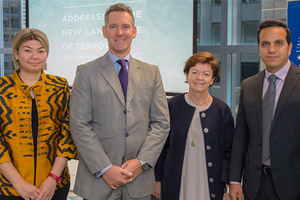Counterterror conference opens with silence and call for youth to be involved in debates
Research news
Alfred Deakin Institute for Citizenship and Globalisation’s major conference on the new landscapes of terrorism started with a minute’s silence to remember the people who have died around the world in terrorist acts and calls by experts for a proper understanding of the causes of terrorism and the urgent need to find ways to help youth develop a role in positive political and social change.
Opening the conference, hosted by the Alfred Deakin Institute for Citizenship and Globalisation, Deakin University’s Vice-Chancellor Professor Jane Den Hollander, reaffirmed the university’s commitment to academic freedom and said conferences such as this were important because they provided a forum for the sharing and contestation of ideas and new developments.
“At Deakin we are very conscious, not only of the role of universities to find the solutions but to communicate the findings in ways that people understand,” she said.
“We, those of us who work in universities, have an important role in creating a place for the contestation of ideas and developing and disseminating some of those solutions.
“Our role is to defend the rights of people to have their ideas heard and to enable the conversation to occur.
“Too often we are curtailed by the majority view and new ideas are lost to silence since it’s too hard to be heard and if hard too hard to deal with the backlash.”
ADI Director and UNESCO Chair for Cultural Diversity and Justice, Professor Fethi Mansouri, reminded conference delegates it had been 15 years since the War On Terror and in the time that had followed hundreds of thousands of people had lost their lives.
“Hundreds of terrorist incidents have taken place, regional conflicts have erupted, cities and societies have been destabilised and all of this mayhem has happened as a direct result of the so-called ‘war on terror’,” he said.
Professor Mansouri said in that time there had been little systematic, objective and non-value laden assessment of what had gone wrong.
He argued it was time that this situation had changed, expressing concern that an escalation of violence in Libya for example would undermine the democracy gains acquired in neighbouring Tunisia .
“I happen to be of Tunisian background and right next to Tunisia is Libya.
“There is a war that is being planned ‘to sort out the mess that is Libya’.
“We know what war did in Syria, in Iraq and what war has done in other places.
“My question is, is war and military intervention led by Western Powers the only answer to overcome the challenges of terrorism?.”
Professor Mansouri challenged delegates to ask what kind of understanding was needed to undermine the ideology of violent extremism and the courageous conversations needed in order to understand the complexity of the problem.
“We fundamentally believe that the only way we can overcome the challenge that faces us for the next few decades is to have a proper understanding and diagnosis of the problem,” he said.
“Failure to do that will result in more badly designed programs, more movement of people and further destabilising of countries across the Middle East and North African region.”
Director Counter-terrorism Middle East, Africa and South Asia Section. Counter-terrorism Branch - Department of Foreign Affairs and Trade Australia and Conference sponsor Bill Elischer said he was pleased to see the conference taking place in Australia.
“The speakers proposed are so central to the discussion and the program leads like a who’s who of counterterrorism,” he said.
“The pressing questions we need to consider are what is happening in parts of our society that is allowing the right wing narrative of extremism to gain traction and the practical steps we can take to repair the damage done in our societies.”
Conference convenor Dr Virginie Andre said the conference had been designed so the knowledge and experience of people from a range of backgrounds and perspectives could be shared.
“This conference has been put together with the hope of harnessing best practices and learning from grass roots and front line practitioners so we can develop partnerships to counter violent extremism,” she said.
“The transnationalism and interconnectivity of hyper-violent extremism calls for a more sophisticated understanding and more effective responses.
“This cannot be achieved without empowering our communities and encouraging young people to be actors in positive social and political change.
“Young people have become more politically conscious of the world we live in and some of its injustices which they feel deeply.
“The world of youth and their sense of belonging and responsibility no longer ends at our sovereign borders, their hearts are torn by suffering of others in Syria and Iraq and in ways that are often at odds with the way they are experienced by their parents and grandparents.
“At the same time young people find themselves at the margins of debates on issues which affect them greatly while having little to say in what is done and what they should do.
“We all have a responsibility to assist young people to find positive hope in the future again and play a part in positive social change.”
Share this story

Key Fact
(L. to R.) Dr. Virginie Andre, Bill Elischer, Jane den Hollander and Prof Fethi Mansouri
